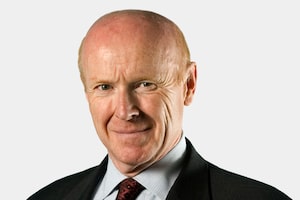Dan Richards is president of Strategic Imperatives. He is a faculty member in the MBA program at the Rotman School at the University of Toronto. He also hosts a weekly conference call called Monday Morning Jump Start, which is about strategies for financial advisors. Advisors can see it GlobeAdvisor.com. He can be reached at richards@getkeepclients.com
Recently, I was reminded of the old axiom that there are three sides to every argument - there's one side, the other side and then the truth somewhere in between.
A couple of weeks back I got two calls from business television shows, asking me to come in to talk about a bitter dispute between the province of Ontario and the mutual fund industry. The dispute concerns charging the proposed new harmonized sales tax (HST), which integrates provincial sales tax and the federal goods and services tax (GST), on mutual fund fees.
The catalyst for these calls was an article in that morning's Globe and Mail about an e-mail leaked to a reporter from someone at a leading mutual fund company. Recounting a conversation with an official in Ontario Finance Minister Dwight Duncan's office, the e-mail said a threat had been made - if the industry kept agitating about the imposition of HST on fund fees, the government would launch a campaign to draw attention to a study indicating the Canadian fund industry's fees rank among the highest in the world. (The accuracy of this study is in dispute - in any event, there were subsequent denials from Mr. Duncan's office that this had ever been considered.)
On the TV shows, both interviewers asked me to explain what this dispute was all about.
I started by saying that I had sympathy for both sides.
Imposing the HST is a difficult and courageous measure for provincial governments. Much like the introduction of the GST, it is designed to be revenue-neutral (in other words, to raise no new taxes over all) and to reallocate taxes in a more consistent, equitable and rational fashion, eliminating historical distortions.
It's hard to argue with that as a goal, and most economists would say replacing the existing provincial sales tax with the HST is the right thing to do, no different than what happened when the GST replaced previously hidden taxes.
Unfortunately, every new measure such as this one creates winners and losers - and inevitably the losers are better organized and more vocal than the winners. It's to the credit of our political leadership that it is doing the right thing, even if it might cost them votes. Further, once government makes an exception in one case, it risks opening the floodgates for other aggrieved parties to ask for similar relief.
So, I see the merit in the government's decision to draw the line and say "No exceptions."
The mutual fund industry's case, on the other hand, rests on the issue of fairness. Quite simply, there are two categories of working Canadians. First are those who work for governments or large companies who typically contribute part of their pay to traditional pension plans that guarantee their income in retirement. These folks are typically not big users of mutual funds - almost all their retirement savings are in their pension plans.
Then there is the growing number of Canadians responsible for their own retirement savings; it's this group that represents the bulk of mutual fund investors.
Let's suppose someone in this second group has $200,000 invested in mutual funds. Before the GST, there would have been no taxes on the fees to manage that individual's funds. Since the GST was introduced in 1991, that person is now paying GST of about $250 each year. If the HST is applied, he or she will pay an additional $400 - a total of about $650 annually.
So what you're left with is a situation in which you have two groups: one group has big company or government pension plans with secure payouts that most of the second group can only dream of - and pays no tax on the fees to manage those plans. The second group has to save for retirement on their own - and each year pays hundreds or even thousands of dollars in tax on the fees to manage their investments.
As an aside, the example I use of $200,000 in savings is far from extreme; if you're 65 and want to be certain your money lasts in retirement, you should limit the amount you withdraw each year to 5 per cent of your savings, so that $200,000 would only generate $10,000 of retirement income.
As the debate unwinds over the weeks and months ahead, there will be two contrasting views at play.
The Ontario government borrows the stance of the late U.S. Supreme Court Justice Oliver Wendell Holmes, who wrote in a judgment: "Taxation is the price of civilization."
The mutual fund industry, on the other hand, looking for an exception to government policy in the name of fairness, draws from American philosopher and poet Ralph Waldo Emerson's expression: "A foolish consistency is the hobgoblin of little minds."
It will be interesting to see which of these sentiments prevails - and also to see whether a sensible compromise can be found.
 Dan Richards
Dan Richards